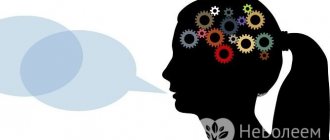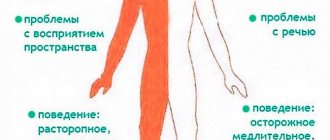Some diseases of the nervous system are accompanied by partial or complete loss of memory - amnesia. In this condition, a person loses the ability to reproduce information about himself and the events of his life.
Signs of amnesia manifest themselves in different ways and at any age, so it is advisable to have an idea of what types of amnesia exist, what are the reasons for the development of this condition, and also which specialists treat this ailment.
Kinds
Experts distinguish the following types of amnesia:
- Childhood - characterized by a person’s lack of memories of infancy. This condition is typical for almost every person.
- Anterograde - a person is unable to remember new events that have happened in his life.
- Retrograde - memories that occurred before its loss disappear from memory.
- Dissociative fugue - a temporary loss of identity occurs when a person mistakes himself for another, and then there is a sharp return of memory.
- Dissociative - specific facts or events from life are forgotten, but the person continues to retain universal knowledge.
- Transient epileptic – temporary memory lapses when the patient continues to behave adequately.
- Cryptomnesia – the source of the information received is forgotten, and the person passes it off as his own.
Mechanism of development of amnesia
Experts have found that the function of storing and reproducing information is performed by cerebral neurons. Disturbances in their work lead to memory loss. If interneuronal messages are completely interrupted, irreversible amnesia occurs. But most often the memory can be restored.
Psychogenic amnesia has a slightly different development mechanism. The brain blocks information that is unpleasant for the patient. How to get amnesia without pain? It is enough to survive any stressful situation. However, it is quite possible that data about what is happening will remain in memory.
Causes
Experts say one of the reasons for the occurrence of amnesia is the presence of mental and neurological diseases. It is these patients who often have memory problems. Pathologies that can trigger amnesia include epilepsy, dissociative disorder or multiple personality disorder, hysteria, schizophrenia and Alzheimer's disease.
Other provoking factors may be blunt or penetrating head injuries, infectious lesions of the brain or nervous system, including AIDS, hepatitis, and poisoning with toxic substances. In addition, it can be caused by: vitamin B1 deficiency in the body, hypoxia, impaired blood circulation in the brain tissue, the appearance of tumors, as well as surgical interventions.
Symptoms
The main sign of a pathological process is the inability to reproduce data about events that occurred earlier. Memory loss most often concerns a certain period of time in the patient’s life. Initially, the patient forgets information received very recently, then loses data about events occurring in the distant past. Memory recovery usually occurs in the reverse order.
With neurogenic disorders, accompanying symptoms may also develop. After receiving amnesia from a stroke, patients often begin to confuse information, perceiving the past for the present and vice versa. Amnesia may be accompanied by other disorders. Quite often, patients’ ability to remember any information decreases.
Inpatient disorder is quite difficult for patients to experience. After receiving amnesia, patients try to remember the lost information. If memory cannot be restored for a long time, depression may develop.
Which doctor treats
In case of sudden memory loss, confusion, disorientation, head injury and other similar symptoms, you should consult a neurologist. Most often, this specialist treats amnesia.
In addition to a neurologist, you may need the help of specialists such as a narcologist, a traumatologist, an infectious disease specialist and a neurosurgeon.
This clinic employs experienced neurologists and a powerful diagnostic base (MRI, ultrasound, Electroneuromyography, etc.). After treatment, high-quality rehabilitation measures are provided. In other words, the patient, while in the clinic, can undergo diagnostics, receive consultation from doctors and begin to recover.
Amnesia is a symptom, in the event of which a person’s relatives or a person, if possible, need to make an appointment with a neurologist. Depending on the type of amnesia, our specialist will determine the causes of its occurrence, as well as treatment tactics and rehabilitation measures.
IMPORTANT! A consultation with a neurologist will help determine further actions to restore the patient’s memory. In addition, the neurologist, if necessary, will refer the person to a narcologist, traumatologist, infectious disease specialist and neurosurgeon.
Make an appointment with a neurologist at our Kuntsevo treatment and rehabilitation center - and help yourself or a loved one get rid of amnesia!
Sign up
How to get amnesia at home?
Almost everyone has memories that they would like to get rid of. However, it is worth understanding that any manipulations aimed at changing the functioning of the brain pose a health hazard. Memory loss can be intentionally provoked by taking certain antidepressants. It should be remembered that any drugs have their side effects. Memory loss can also be caused by intoxication with mushrooms, alcohol, and synthetic drugs. At the same time, there is a huge risk of losing not only memory, but also health.
Hypnosis sessions will help you remove negative memories without pain or harm. Only a true professional can do the job efficiently. With the help of hypnosis, you can not only erase unwanted information from the past, but also restore some memories.
Treatment methods
To combat amnesia, doctors use an integrated approach, which involves both psychotherapeutic influence and drug therapy.
Treatment of amnesia is carried out under the strict supervision of a doctor, taking into account the reasons that provoked the onset of the disease. Today, a lot of methods and techniques have been developed, and many medications are produced to help solve this problem. At the same time, special exercises are used to train memory.
Is it possible to erase a person's memory?
The brain part of the body is responsible for this function. Thanks to it, information is remembered, stored and reproduced. However, with all the latest technologies and brilliant successes in the scientific world, this topic has been studied rather poorly.
Conducted research and experiments have not given scientists a clear answer to how this property works and what its principles are. Methods for partial or complete removal of memories cannot be predicted. Therefore, it is highly not recommended to use memory erasing in solving problems.
However, such a phenomenon does exist. In science it is known as amnesia. This is not an isolated disease, but only a consequence of certain disorders in the body. Which ones I have already described above.
I will only add that external catalysts, such as serious injuries, are also unpredictable and can cause damage to physical and mental health, as well as lead to tragic consequences. Internal reasons related to human psychology, in turn, provide hope for recovery, and with effort, the process can be made controllable.
Rehabilitation and lifestyle restoration
Memory loss is psychologically quite difficult for patients to bear. In this case, the rehabilitation process is very important. Specialists help such patients recall the past and remember new information.
Important! In such a difficult period for the patient, the support and understanding of loved ones is necessary. With their help, the recovery process will go much faster.
In addition to special exercises conducted with specialists, the rehabilitation program includes the following:
- Learning poems and songs. You can start with the material you learned in childhood, and then move on to new ones.
- Balanced diet. The menu includes walnuts, wild berries, dark chocolate, carrots, broccoli, seafood, etc.
- Active lifestyle. Sports, dancing, and walks in the fresh air help restore memory.
In addition, regular brain exercises, such as crosswords and puzzles, help.
Special exercises
"Rite"
The essence of the exercise is to get rid of bad memories in the form of a ritual. A person responds well to various psychological anchors created by psychotechnics.
- Option 1. Wash away memories by pouring water on yourself.
It is necessary to imagine a negative experience in the form of dirt or dust adhering to the body. In the process, the water washes away all this dirt, freeing the consciousness. If fantasy is developed well enough, the technique will help you completely get rid of worries about negative experiences. - Option 2. Burn your memories by first writing them down on a piece of paper. It is better to describe the event or situation in as much detail as possible in order to draw the emotions out. Then it will be easier to remove them thanks to the visual sequence of human actions.
- Option 3. You can bury memories if there is something associated with a negative event. In this case, you can arrange an impromptu funeral for this thing, mentally connecting and burying all negative emotions with it.
"Perception"
You need to remember the events as a fragment from a film , i.e. watching him from the side.
Now you can start:
- scroll through the situation in your head, trying on the role of each participant in the event;
- scroll through the situation in your head as if you were looking at what is happening through a TV screen, changing the playback speed from minimum to maximum;
- “color” the picture, observing it in green, red, blue;
- Zoom in and out of people participating in dialogues.
All this will help reduce the significance of the event and the individual people involved in the situation.
Lifestyle
Patients diagnosed with amnesia should exercise regularly, train their memory, eat right and not neglect visits to the doctor.
Important! The main step to renewing and preserving memory is leading a healthy lifestyle. Bad habits have a detrimental effect on brain function.
Those who would not like to face such a problem should be more attentive to their own health, control emotional and physical stress, get enough sleep, lead a healthy lifestyle and not self-medicate when the first symptoms occur.
Description of aircraft
The word comes from “let”, meaning the river of oblivion. The technique is used to suppress annoying thoughts or get rid of information that has lost its relevance.
There are two ways:
- Suppression. The more a person tries not to remember, the more annoying the phenomena become. Describe them on a piece of paper, based on all the details. Try to throw out the negativity on paper, visualizing what happened. Then burn the note and watch the fire. At the same time, try to realize that the moments of the past turn into ashes and crumble.
- Delete. Unnecessary data can be eradicated by the “flight rag” exercise. If information is represented in your head by images, mentally pick up the cloth and erase them. Think about how they disappear and are no longer there.









